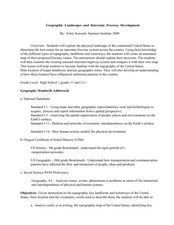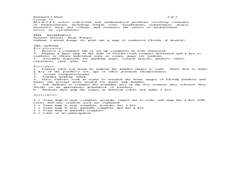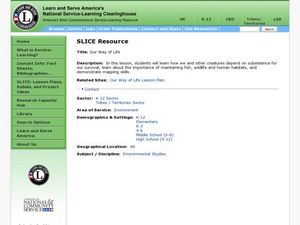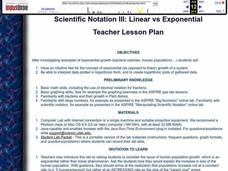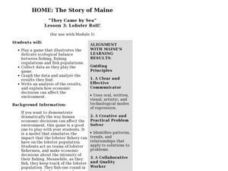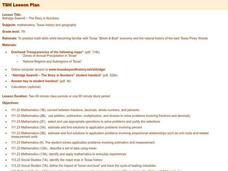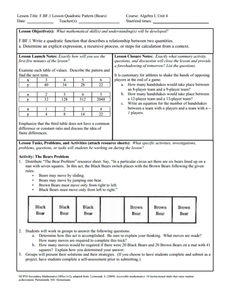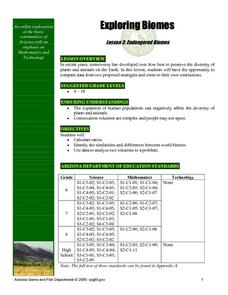Curated OER
Twisted Vision
Students explain polarization vision and why some animals have it while others do not. They examine the reasons why it would be helpful for marine organisms to have polarized light.
Curated OER
Southern Agriculture and the Slave Trade
Students examine the relationship between agriculture and the slave trade during the 1860s. In groups, they research how two factors led to the explosion of slavery in the Southern United States. Using maps, they answer comprehension...
Curated OER
Geographic Landscapes and Interstate Freeway Development
Students investigate the topography of the United States through a discovery lesson. They create a hypothetical route for a highway across the United States. Students also conduct research major landforms and define geographic terms.
Curated OER
Home on the Range
Students use maps and mathematics to determine the appropriate panther population in a given area. In this Florida ecology lesson, students research the area requirements of male and female panther and use a map to help calculate how...
Curated OER
Our Way of Life
Students interview Native American Elders about animal migration, traditional food gathering, and subsistence. They research endangered animals, draw a game cycle, and create maps of local migration of animals.
Curated OER
Solid Waste
Students examine how to use their vocabulary, writing skills, and creative thinking to address environmental concerns in this unit. They write messages to using creative writing to address the issues of solid waste and recycling.
Curated OER
The Atrazine Dilemma
Young scholars understand how farming practices and the topography of a region can effect the health and safety of all living things. Students play a game which helps them understand how the chemical Azatrine has spread in the watershed.
Curated OER
Scientific Notation III: Linear vs Exponential
High schoolers examine the differences in exponential growth and linear growth of a system. They interpret data on graphs and develop their own charts. They answer discussion questions as well.
Curated OER
Lesson 3: Lobster Roll!
Students play a game that illustrates the delicate ecological balance between fishing, fishing regulations and fish populations. They collect data and analyze the results.
Curated OER
Land Biomes Research and Presentation
Fifth graders work in cooperative groups to research an assigned land biome using various sources. Groups create either a book or a PowerPoint presentation of their assigned land biome.
Curated OER
Marine Debris
Students will perform experiments to examine if debris will float, or blow in the wind. They discuss the effects of these characteristics on marine debris.
Curated OER
Fish Now or Later
Students describe the effects of over-harvest on a salmon population. They explain the importance of salmon to many communities in Alaska. They manage harvest levels to maintain a sustainable population.
Curated OER
Discovering the Mathematics of Sound
Students study the basic skills of algebraic manipulations. They practice the application of basic mathematics in science and determine the nature of good acoustics. They develop proposals for providing good acoustics and identify...
Curated OER
Teaching the Tr'panier Trapezoid Kite
Learners analyze how the parts of a system go together and how these parts depend on each other. They comprehend the forces in terms of strength and direction. Students observe, measure and describe weather indicators.
Curated OER
Introducting the Concept of Medical Ecology
Tenth graders examine the effects of the breakout of the West Nile Virus. They make predictions on its origin. They develop and present an action plan to stop the virus from spreading.
Curated OER
Aldridge Sawmill - The Story in Numbers
Seventh graders practice math skills while becoming familiar with Texas' "Boom & Bust" economy and the natural history of the east Texas Piney Woods. They utilize worksheets and websites imbedded in this plan.
Curated OER
Alternative Power Project
Tenth graders identify existing forms of energy and create possible solutions to resource limitations.
Curated OER
Discovering the Past Using the Future: Remote Sensing and the Lost City of Ubar
Learners identify and locate specific locations on the Arabian Peninsula, the Rub al Khali Desert, and present day Oman. They identify other names for the lost city of Arabia as Ubar, the Atlantis of the Sands, Iran, and the city of towers.
Curated OER
Transport
Students analyze wind barbs and determine which way the wind is blowing and how hard the wind is blowing. They access near real time wind data and pollutant animations to track the transport and destination of pollutants.
Curated OER
Noah's Ark, Revisited
Fourth graders do a visual presentation for a specific endangered species.
Curated OER
Bears
Young scholars complete a variety of bear-related activities. They sort and graph teddy bears, distinguish between real and non-real bears and research bear life cycles and habitats.
Curated OER
Discovering the Past Using the Future: Remote Sensing and the Lost City of Ubar
Learners use a video, maps, worksheets and Internet research to explore the role that sensing played in locating Ubar - the lost city of Arabia.
Curated OER
Lesson 3: Making a Living
Students, in groups, create hypothetical financial plans for a colonial Maine family living on the frontier.
Curated OER
Endangered Biomes
Students compare data from two proposed strategies on how ot best preserve the diversity of plants and animals. They complete a worksheet and share theirviews with the rest of the class.




